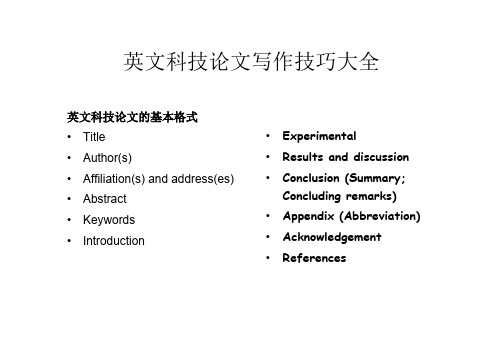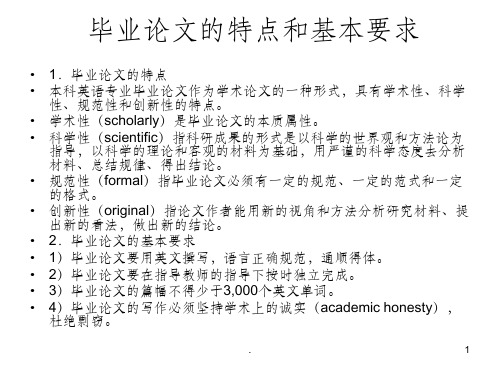如何撰写英文学术论文
- 格式:ppt
- 大小:1.83 MB
- 文档页数:46


学术论文英文摘要格式学术论文英文摘要格式英文题名和英文摘要是学术类和技术类科技期刊论文的重要组成部分,是国际间传播、学术交流与合作的桥梁和媒介,有其特殊的意义和作用。
好的英文题名和英文摘要对于增加期刊和论文的被检索和引用机会、吸引读者、扩大影响起着不可忽视的作用。
为了帮助读者撰写论文英文题名和英文摘要,本文总结了学术论文英文摘要格式的基本要求及注意事项,以给读者提供参考和指导。
学术论文英文摘要格式一、论文题名1.英文题名撰写的基本要求题名应简明、具体、确切,能概括文章的主旨,符合编制题录、索引和检索的有关原则并有助于选择关键词和分类号。
中文题名一般不超过20个汉字,必要时可加副题名。
题名中应避免使用非公知公用的缩略语、字符、代号以及结构式和公式。
英文题名的首字母及各个实词的首字母应大写。
2.英文题名撰写的注意事项除了以上基本要求,我们在写英文题名时还应注意以下几个问题。
(1)英文题名的结构。
英文题名以短语为主要形式,尤以名词短语最常见,即题名基本由一个或几个名词加上其前置和(或)后置定语构成。
短语型题名要确定好中心词,再进行前后修饰,要注意采用正确的单词顺序,形容词应与其所修饰的名词紧密相邻。
(2)英文题名中的冠词有简化的趋势,凡可用可不用的冠词均可不用。
英文题名开头第一个字不得用the, and, an和a。
(3)英文题名中的大小写有以下3种格式:全部字母大写;每个词的首字母大写,但3个或4个字母以下的冠词、连词、介词全部小写;题名第一个词的首字母大写,其余均小写。
(4)中英文题名的一致性。
同一篇论文,其英文题名与中文题名内容上应一致,但不等于说词语要一一对应。
在许多情况下,个别非实质性的词可以省略或变动。
总之,题名的用词十分重要,它直接关系到读者对文章的取舍态度,务必字字斟酌。
二、论文摘要1.摘要的定义摘要又称概要、内容提要。
摘要是论文主体的高度浓缩,它应该能提炼论文的主要观点,简明地描述论文的内容和范围,简短地进行概括和总结。


英文科技论文写作技巧大全英文科技论文的基本格式•Title•Author(s)•Affiliation(s) and address(es) •Abstract•Keywords•Introduction •Experimental •Results and discussion •Conclusion (Summary;Concluding remarks) •Appendix (Abbreviation)•Acknowledgement •References2.基本要求(1)Title长短适中,概括性强,重点突出,一目了然。
(2)Author(s)姓氏和名字要容易弄清楚,以免发生以名代姓。
(3)Affiliation(s) and address(es)准确清楚,使读者能按所列信息顺利地与作者联系。
(4)Abstract不宜太详尽,也不宜太简短,应将论文的研究体系、主要方法、重要发现、主要结论等,简明扼要地加以概括。
不要将结论与提要重复使用。
(5)Introduction说明本研究的目的意义。
归纳与本研究密切相关的前人研究结果及有关文献,指出本研究与前人研究的不同之处。
说明本论文要解决的问题及方法、手段等。
不宜将本论文的结果在“绪论”中叙述。
(6)Experimental叙述主要的实验过程、方法、仪器设备、试剂来源及规格等。
不宜将实验结果在“实验部分”中叙述。
(7)Results and discussion是论文的核心部分,要求:–数据及图表的内容及含义交代清楚,有条理;–对数据及现象的归纳、演绎、解释、立论要有逻辑性、自洽性。
–语句要准确、流畅、多样化,不宜重复使用相同的句型和词汇。
(8)Conclusion (Summary, Concluding remarks)简明扼要地归纳出本论文的新发现、新观点、新理论等。
不宜将“结果及讨论”部分的语句直接抄录作为结论。
(9)References要按所投杂志规定的格式准确书写。

(中)英文科技论文WORD写作之格式规范ABC
1
2
谢青季(xieqj123@)执笔
3
湖南师范大学
4
2011.01.15
5
6
7
一、写在前面的话
8
9
图文材料的撰写和交流是每个人自己一辈子的必修课。
学术论著是自己用好已学知识、10
创造新知识的能力的综合反映。
通过论著出版,可以让全世界都很方便地“看到”自己。
11
研究生期间是学习和锻炼文字表达的重要阶段,其中,文字撰写的规范性从来就不是可12
有可无的东西。
“白纸黑字”,出自你的图文材料的规范程度会反映你是训练有素还是经验不13
足,是严谨细致还是粗心毛糙。
态度决定一切,我们希望实验室每位人员都有良好的习惯,14
成为严谨、规范、负责的专家。
15
鉴于实验室论文撰写过程中的一些普遍问题,特制作以下简表,跟各位初探论文撰写的16
规范性,望仔细研读并提出意见和建议。
17
18
二、简表
(2)大显示比例(如300%)下鼠标右键拷贝至粘贴板:
19
20
21。

学术论文写作报告(英文版)Title: An Analysis of Expository Writing in Academic Research PapersAbstract:This report presents a comprehensive analysis of expository writing in academic research papers. The objective of this study is to identify the key components of effective academic writing and provide recommendations for researchers, especially novice writers, to enhance their writing skills. Various sources, including published academic papers and books on the topic, were reviewed and analyzed to support the findings. The report suggests that an organized structure, clear language, logical reasoning, proper citation practices, and adherence to academic writing conventions are essential elements of successful academic writing.1. Introduction:Academic research papers serve as a means of communication among scholars in various disciplines. It is crucial for researchers to present their ideas and findings in a clear and concise manner to facilitate effective knowledge exchange. This report aims to explore the characteristics of expository writing in academic research papers and provide guidelines for researchers to improve their writing skills.2. Organization and Structure:Academic research papers should have a well-organized structure to convey ideas in a systematic manner. The introduction should provide background information and clearly state the research objectives. The body paragraphs should present the mainarguments in a logical and coherent way, supported by relevant evidence. Finally, the conclusion should summarize the findings and provide implications for further research.3. Clarity of Language:Clear and concise language is fundamental in academic writing. Researchers should aim to convey their ideas in a straightforward manner, avoiding jargon and unnecessary complexity. Using simple and precise language helps readers understand the content more easily and efficiently.4. Logical Reasoning:Academic research papers should exhibit a clear and logical flow of thoughts and arguments. Each paragraph should be logically connected to the previous and following ones, and the overall structure should guide readers through the research process. Using appropriate transitions and connecting phrases can improve the coherence and readability of the paper.5. Citation Practices:Proper citation practices are crucial in academic writing to acknowledge the contributions of other researchers and avoid plagiarism. Researchers should meticulously cite all the sources they have referred to using a recognized citation style, such as APA or MLA. Failure to properly cite sources can result in academic dishonesty and reputational damage.6. Adherence to Academic Writing Conventions:Academic writing follows specific conventions, such as using the third person, avoiding personal opinions, and maintaining a formaltone. Researchers should familiarize themselves with these conventions and ensure their papers adhere to them to maintain the integrity and credibility of their research.7. Conclusion:Effective academic writing requires attention to various elements, including the organization and structure of the paper, clarity of language, logical reasoning, proper citation practices, and adherence to academic writing conventions. Novice researchers can benefit from understanding and implementing these key components, ultimately enhancing the quality and impact of their research papers. Continuous practice and seeking guidance from experienced researchers can further improve their writing skills. 8. Recommendations:To further improve academic writing skills, researchers should actively engage in peer-review processes, attend writing workshops and conferences, and seek feedback from their mentors and colleagues. Writing groups and online forums dedicated to academic writing can also provide valuable support and guidance. In conclusion, this report highlights the importance of expository writing in academic research papers and provides recommendations for researchers to enhance their writing skills. By adhering to the identified key components, novice researchers can produce high-quality academic papers that contribute to the advancement of knowledge in their respective fields.9. Key Components of Effective Academic Writing:9.1. Organization and Structure: A well-organized structure is a key component of effective academic writing. It helps readersnavigate through the research paper and understand the flow of ideas. Researchers should ensure that their papers have a clear and logical structure, including an introduction, body paragraphs, and a conclusion. The introduction should provide the necessary background information and context for the research, as well as clearly state the research objectives. The body paragraphs should present the main arguments or findings supported by relevant evidence and analysis. Finally, the conclusion should summarize the key findings and provide implications for future research.9.2. Clarity of Language: Clarity of language is crucial in academic writing. Researchers should strive to communicate their ideas in a clear and concise manner to ensure that readers can easily understand the content. The use of jargon and unnecessary complexity should be avoided. Instead, researchers should use simple and precise language to convey their ideas effectively.9.3. Logical Reasoning: Logical reasoning is a fundamental component of academic writing. Researchers should present their arguments in a logical and coherent manner, providing evidence and analysis to support their claims. Each paragraph should flow logically from one idea to the next, and there should be a clear connection between different sections of the paper. The use of appropriate transition words and phrases can help improve the coherence and readability of the paper.9.4. Proper Citation Practices: Proper citation practices are essential in academic writing to acknowledge the contributions of other researchers and avoid plagiarism. Researchers should carefully and accurately cite all the sources they have referred to intheir papers. This includes both in-text citations and a comprehensive reference list at the end of the paper. Different citation styles, such as APA, MLA, or Chicago, have specific guidelines that researchers should follow. Failure to properly cite sources can have serious consequences, including academic misconduct and damage to one's reputation.9.5. Adherence to Academic Writing Conventions: Academic writing follows certain conventions and standards that researchers need to adhere to. These conventions include using the third person, maintaining a formal tone, and avoiding personal opinions unless specifically requested in certain types of papers, such as opinion or reflection pieces. Researchers should familiarize themselves with the specific conventions of their field or discipline and ensure that their writing aligns with these expectations. Adhering to academic writing conventions helps maintain the integrity and credibility of the research.10. Recommendations for Enhancing Academic Writing Skills: 10.1. Seek Peer Review: Peer review is a valuable process for improving academic writing skills. Researchers should actively seek feedback from their peers and colleagues. They can join writing groups or engage in peer review exchanges to receive constructive criticism and suggestions for improvement. Peer review provides an opportunity to identify areas of weakness or confusion in the writing and make necessary revisions.10.2. Attend Writing Workshops and Conferences: Writing workshops and conferences offer researchers the chance to learn from experts in the field and gain insights on effective academicwriting techniques. These events often provide practical tips, strategies, and resources for improving writing skills. Researchers should take advantage of these opportunities to enhance their writing abilities.10.3. Seek Feedback from Mentors and Colleagues: Seeking feedback from experienced mentors and colleagues can be incredibly helpful in improving academic writing skills. These individuals can provide valuable insights and guidance based on their own experiences. Researchers should actively seek their feedback on drafts and revisions to refine their writing.10.4. Practice Regularly: Like any skill, academic writing requires regular practice to improve. Researchers should set aside dedicated time for writing and make it a habit. Regular practice allows researchers to develop their own writing style, become more comfortable with academic writing conventions, and refine their ability to convey complex ideas clearly.10.5. Utilize Writing Resources: Various writing resources are available to researchers to enhance their writing skills. Academic writing books, online tutorials, and writing guides can provide guidance on grammar, style, and organization. Researchers should take advantage of these resources to expand their knowledge and improve their writing.10.6. Seek Guidance from Writing Centers: Many universities and institutions have writing centers or writing support services that offer individualized assistance to researchers. These centers provide guidance on various aspects of academic writing, such asstructure, language, and citation practices. Researchers should utilize these resources to receive specialized support and feedback on their writing.In conclusion, effective academic writing requires attention to various key components, including organization and structure, clarity of language, logical reasoning, proper citation practices, and adherence to academic writing conventions. Novice researchers can enhance their writing skills by implementing these components and by actively seeking feedback, participating in workshops, and practicing regularly. With time and effort, researchers can improve their ability to communicate their ideas effectively through well-crafted academic research papers.。
二、英文写作的语言技巧1. Introduction:A. 如何指出当前研究的不足并有目的地引导出自己研究的重要性?在叙述前人成果之后,用However来引导不足,提出一种新方法或新方向。
如:However, littleinformation(little attention/little work/little data/little research……) (or few studies/few investigations/few researchers/few attempts……) (or no/none of these studies……) has (have) been done on (focused on/attemptedto/conducted/investigated/studied(with respect to))。
如:Previous research (studies, records) has (have) failed to consider/ ignored/ misinterpreted/ neglectedto/overestimated, underestimated/misleaded. thus, these previous results are inconclisive, misleading, unsatisfactory, questionable, controversial. Uncertainties (discrepancies) still exist……研究方法和方向与前人一样时,可通过以下方式强调自己工作:However, data is still scarce(rare, less accurate),We need to(aim to, have to) provide more documents(data, records, studies, increase the dataset). Further studies are still necessary(essential)……强调自己研究的重要性,一般还要在However之前介绍与自己研究问题相反或相关的问题。